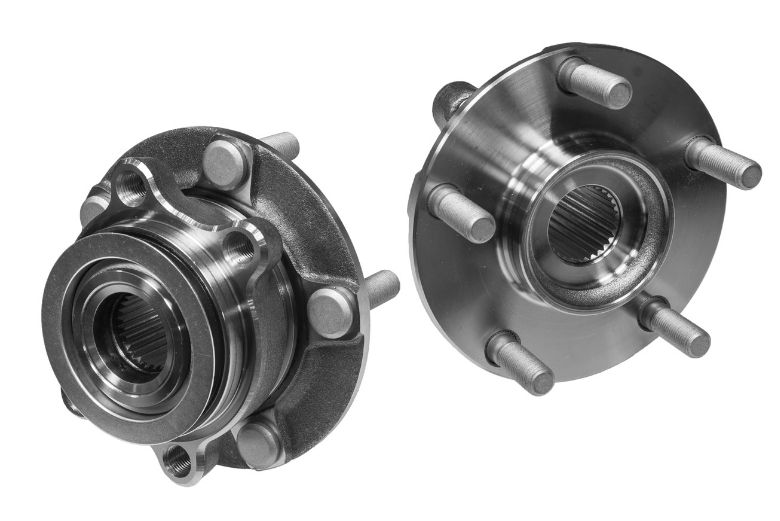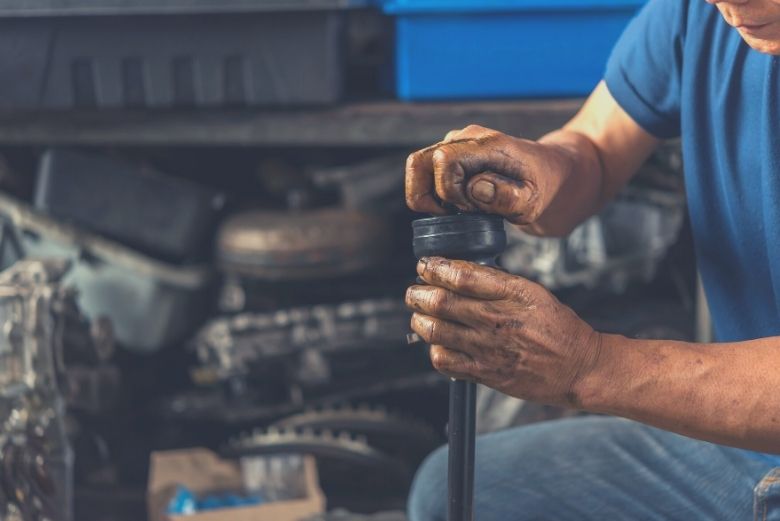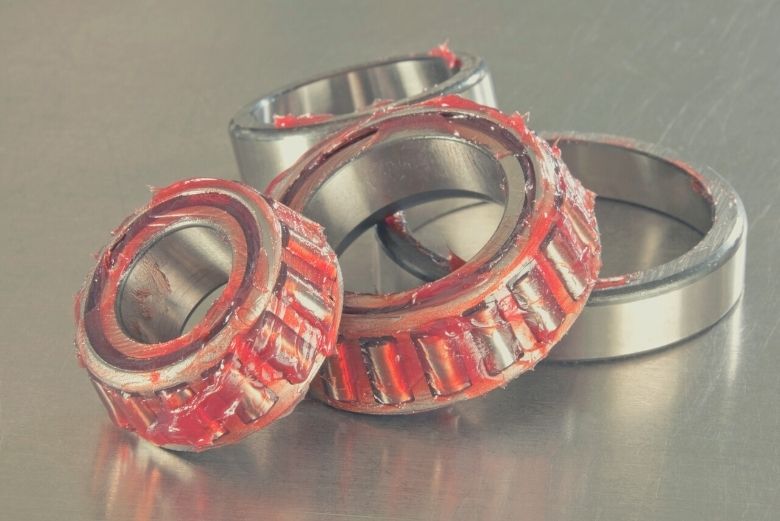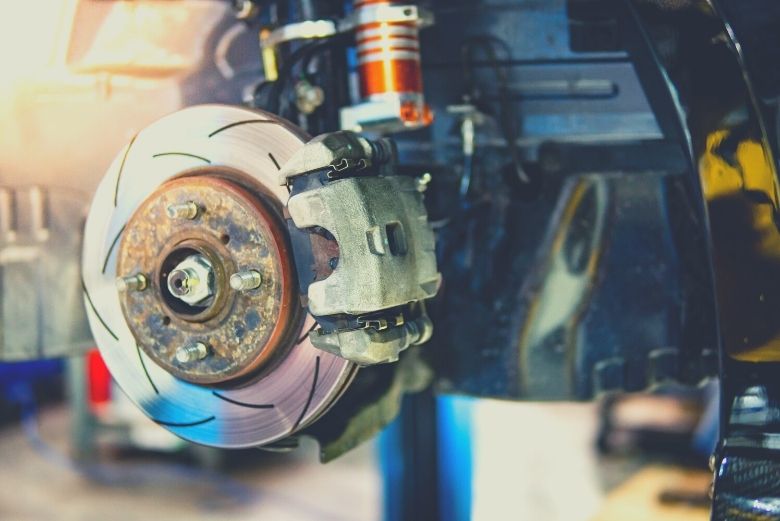If you’re like me, you probably thought that wheel bearing grease is wheel bearing grease, right?
Black, gooey, stinky, but it gets the job done.
That may have been true a few decades ago, but not anymore.
Wheel bearing grease, like cars, has evolved tremendously. There are now synthetic wheel-bearing greases and multi-purpose grease.
Yes, you can still find plain old wheel bearing grease as well.
What are the differences between all these types of grease?
A quality grease is important.
It will keep your wheel bearings undamaged and extend the life of the bearing and hub. You definitely want to stick with the best wheel bearing grease you can find.
The best wheel-bearing grease will repel water, inhibit rust, and slow down oxidation. It will also withstand the pressure that modern-day cars can put on wheel bearings.
This is especially true if you have a 5th-wheel, an RV, or if you pull a trailer. The wheel bearings must be kept well-greased to prevent a disaster of epic proportion.
By that, I mean a seized wheel bearing while driving. Yikes!
I’m going to look at the differences between synthetic wheel bearing grease, regular grease, and “heavy-duty” or “all-purpose” grease.
This way, you can make a more informed decision on a lubricant that sounds so ordinary but is actually vitally important.
Best Overall
- For all U.S., European and Japanese Vehicles
- Provides superior high- and low-temperature protection (-60°F to 425°F) over conventional greases
- Moly-fortified for increased film strength and exceptional resistance to heavy loads
- Extreme pressure fortified
Prices pulled from the Amazon Product Advertising API on:
Product prices and availability are accurate as of the date/time indicated and are subject to change. Any price and availability information displayed on [relevant Amazon Site(s), as applicable] at the time of purchase will apply to the purchase of this product.
If you’ve been reading my reviews, you know I’m a long-time fan of Valvoline products. While I admit that I was a bit skeptical about using synthetic grease, I am now a huge fan.
Synthetic grease has excellent temperature protection. Valvoline states that this grease can withstand temps from -60 degrees to over 425 degrees!
Keeping grease stable at extreme temperatures means wheel bearings remain cooler and have a longer life.
“Moly-fortified” means that it contains a compound called molybdenum disulfide. This offers protection from extreme pressure and has anti-wear compounds. Both are highly desirable when talking about wheel bearings.
I love this wheel bearing grease because, this might sound strange, but it’s the greasiest stuff I have ever tried! It is super slick and stays greasy.
You can wash it off, but it ain’t easy! So be careful with clothing or car seats!
Pros
- This is a multi-use product that works for wheel bearings, caliper bolts, even on the back of brake pads to eliminate squeaking
- It’s super thick and greasy
- It outlasts anything else I have ever used
Cons
- I read numerous complaints about leaks from cracked tubs or tubes during shipping
- This synthetic grease separates when stored for months and must be remixed
- It’s not suitable for marine use
If you have never tried synthetic grease, I guarantee that you are going to be impressed with this one. Valvoline has a real winner with this synthetic grease.
Runner Up
- Lasts four times longer than regular grease
- Virtually waterproof
- All temperature stable
- Exceeds lube for life specifications
- Ultimate grease for high speed bearings
Prices pulled from the Amazon Product Advertising API on:
Product prices and availability are accurate as of the date/time indicated and are subject to change. Any price and availability information displayed on [relevant Amazon Site(s), as applicable] at the time of purchase will apply to the purchase of this product.
Lucas Oil is another brand name that has been around for decades. They are well-known for making quality products.
This grease comes in a cartridge for easy dispensing. Don’t let the green color fool you! This is wheel bearing grease that is made for heavy-duty use, such as trucks, farm equipment, and more.
You can still use this on your car. You will have more protection than your vehicle requires.
I like this grease from Lucas Oil because it is virtually waterproof. If you go off-roading, if you have a truck, or if you live in areas where you frequently drive on water-logged highways, this is an excellent choice.
Lucas Oil grease exceeds all OEM requirements and is more stable than the old-fashioned conventional lithium grease. This is not a synthetic grease either, but a polyurea-based grease.
Pros
- It’s almost completely waterproof
- It works well in high-heat environments
- It also doesn’t separate as synthetic greases can
Cons
- It can not be mixed with lithium-based grease
- A few users complain that the tube spits out grease when the tab is pulled off
Lucas Oil Heavy Duty Grease is the tough stuff. You want it for wheel bearings, u-joints, ball joints, and anywhere that you need lubrication that doesn’t wash off.
Best Wheel Bearing Grease for Trailers
- Lasts four times longer than regular grease
- Virtually waterproof
- All temperature stable
- Exceeds lube for life specifications
- Ultimate grease for high speed bearings
Prices pulled from the Amazon Product Advertising API on:
Product prices and availability are accurate as of the date/time indicated and are subject to change. Any price and availability information displayed on [relevant Amazon Site(s), as applicable] at the time of purchase will apply to the purchase of this product.
Here I am, recommending Lucas Oil Grease once more, but this time with a slightly different twist. This grease comes in a one-pound tub.
Trailers are notorious for having wheel-bearing problems. I’ve replaced a few in my time and nearly every bearing was burned out due to overheating.
Regular lithium-based wheel-bearing grease rarely lasts on trailers. That’s why I recommend you use something better, Lucas Oil X-Tra.
This grease is very temperature stable, is almost 100% waterproof, and lasts forever.
Well, ok, maybe not forever.
Lucas Oil says 4 times longer, which will make it seem like forever. Lucas Oil grease is also a great rust inhibiter. Yes, this grease is a dark green color.
I like this grease because it stays soft even in high temps. That is really important when towing to prevent burned-out wheel bearings on your trailer.
Pros
- While nothing lasts forever, Lucas Oil grease is super-long lasting
- It won’t separate like synthetic grease can
- This is perfect for off-road vehicles, snowmobiles, and, of course, trailer bearings
Cons
- I found a few complaints about tubs being ¾ full but this is sold by weight, not volume
- Other users complained that the grease was too thick
All grease is NOT created equal. If you have a trailer, you want Lucas Oil X-Tra Heavy Duty Grease for your wheel bearings.
Is wheel bearing grease different?

There are more types of grease in this world than you can shake a stick at. The type of grease you need will depend on the type of application and performance.
For example, a race car will need a different type of wheel-bearing grease than the 2015 Nissan Altima you use for your daily commute.
Wheel-bearing grease should reduce wear and friction, repel water, and be thick enough that it won’t easily leak past the seals.
Off-road vehicles that go through harsh environments will use a wheel-bearing grease that offers film strength, superior water resistance, and good protection from rust and corrosion.
The majority of cars and SUVs on the road today need a good wheel-bearing grease that has excellent oxidation stability. It should offer good performance over a wide range of temperatures, and be stable for long periods.
Can you over grease wheel bearings?

Yes, you can over grease wheel bearings.
While grease is a good thing, sometimes too much of a good thing is a waste of money. In this case, can even have the opposite effect.
When there is too much grease, the wheel bearings will push out the excess. This actually increases the temperature within the hub. Increased temperatures will wear out the bearings prematurely and then create a huge mess.
How much grease should you put in a bearing?

If you are lucky enough to have a pump or a press that pushes the grease into the bearings, one pump of the handle should be enough to fill the wheel bearing.
The housing should only be half full. You can also coat the inner wall of the hub with a finger full of grease.
If you are doing it by hand, this short video shows exactly how it should be properly done.
Can you mix grease in wheel bearings?

No, you should not mix grease in wheel bearnings.
Different types of grease have different thickening agents and other types of compounds. These might interact with one another and cause the grease to become hard or to become so thin it’s almost like not having any grease!
Yikes! Don’t mix them.
For example, most general purpose grease is lithium based. Marine grease is calcium based. They are not compatible and should not be mixed.
It is far better to clean and remove as much old grease from bearings before adding new grease.
Conclusion
While everyone has their favorite brands, there is often a good reason behind that. I’ve used Valvoline products for nearly half a century.
I have never, ever been disappointed.
Valvoline Moly-Fortified Gray Full Synthetic Grease is one of the best products I have used.
The addition of the molybdenum offers improved film strength and is the perfect choice for extreme pressure conditions or even everyday commuter traffic.
This grease also has excellent corrosion and rust resistance. The product’s ability to handle extreme temperatures and not break down is the best-selling point.
Most wheel bearing failure is due to the breakdown of grease. Then you have metal fatigue and overheating of the bearing due to a lack of lubrication.
No matter what you are driving, your wheel bearings will benefit from Valvoline Moly-Fortified Gray Full Synthetic Grease.

